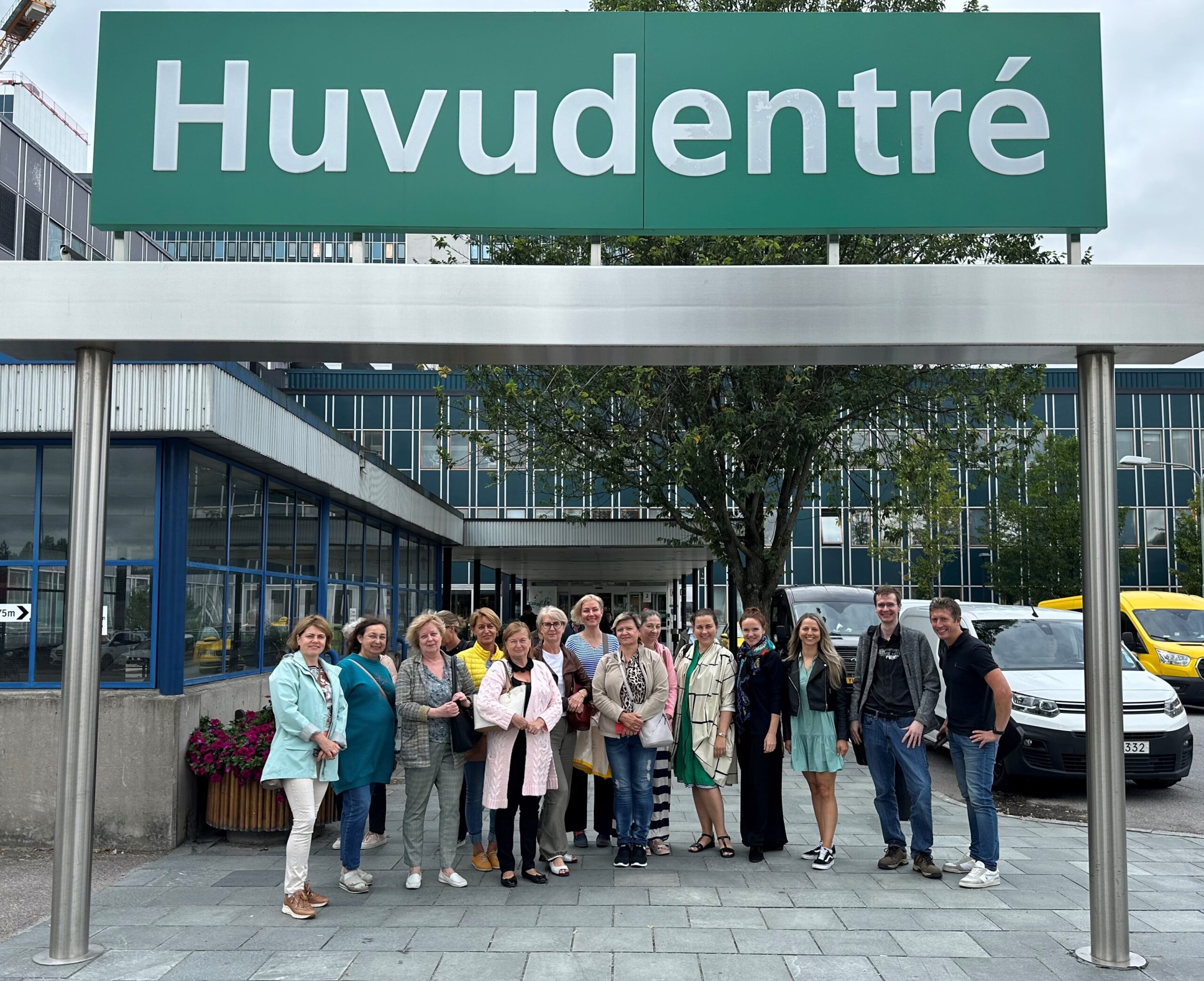info@puhastusekspert.ee +372 5611 1048
Study Visit to Sweden, August 22-24, 2023
From August 22-24, a study visit to Sweden was organized by Puhastusekspert. The study visit included consortium members from East Tallinn Central Hospital, North Estonia Medical Centre, Valga Hospital, Rakvere Hospital, Järvamaa Vocational Education Centre, and Puhastusekspert.
The trainers for the study visit were Martin Älenmark, Head of Optiqo Sweden AB, and Karin Perling, trainer at Visera AB.
One of the main objectives of the study visit was to learn how the relevant standard is applied in hospitals for determining cleaning quality. In March 2023, Standard EVS944:2023 Cleaning Requirements for Healthcare Facilities, which regulates cleaning in hospitals and healthcare institutions, came into force in Estonia. This is a translation of a standard initiated by the Danish Health Authority in 2008 in Denmark (Infection control in the health care sector – Part 10: Requirements for Cleaning). This standard is used to measure cleaning quality in Denmark, Sweden, Norway, and Iceland.
The trainers for the study visit were Martin Älenmark, Head of Optiqo Sweden AB, and Karin Perling, trainer at Visera AB.
One of the main objectives of the study visit was to learn how the relevant standard is applied in hospitals for determining cleaning quality. In March 2023, Standard EVS944:2023 Cleaning Requirements for Healthcare Facilities, which regulates cleaning in hospitals and healthcare institutions, came into force in Estonia. This is a translation of a standard initiated by the Danish Health Authority in 2008 in Denmark (Infection control in the health care sector – Part 10: Requirements for Cleaning). This standard is used to measure cleaning quality in Denmark, Sweden, Norway, and Iceland.

Danderyd Hospital, Stockholm, Optiqo software
During the study visit training, we visited Danderyd Hospital in Stockholm, where we familiarized ourselves with the organization of hospital cleaning, the maintenance of cleaning textiles, the assembly of cleaning trolleys, and the use of the Optiqo software solution for work planning and data collection.
Additionally, we familiarized ourselves with the capabilities of Optiqo software, which is applied in optimizing, organizing, collecting data, and analyzing cleaning operations. Implementing Optiqo software for assessing cleaning quality saves a significant amount of time and provides an excellent opportunity to quickly implement necessary changes based on statistical data conclusions.
During the study visit, we gained a great deal of knowledge and also confirmed much of what we already knew. Learning from the experience of others is of the greatest value, as it helps to quickly implement existing solutions and avoid potential errors.
As an important fact, it can be highlighted that according to studies, 80% of infections are transmitted via hands, which is why hand hygiene is of crucial importance. In a hospital setting, to prevent infections, it is important first to understand who moves within the hospital premises – patients, doctors, nurses, caregivers, cleaning staff, visitors, logistics personnel, maintenance technicians, etc. Secondly, it is necessary to raise the awareness and skills of all these individuals to prevent and hinder the spread of infections. Therefore, the key to health safety lies primarily in trained personnel.
Additionally, we familiarized ourselves with the capabilities of Optiqo software, which is applied in optimizing, organizing, collecting data, and analyzing cleaning operations. Implementing Optiqo software for assessing cleaning quality saves a significant amount of time and provides an excellent opportunity to quickly implement necessary changes based on statistical data conclusions.
During the study visit, we gained a great deal of knowledge and also confirmed much of what we already knew. Learning from the experience of others is of the greatest value, as it helps to quickly implement existing solutions and avoid potential errors.
As an important fact, it can be highlighted that according to studies, 80% of infections are transmitted via hands, which is why hand hygiene is of crucial importance. In a hospital setting, to prevent infections, it is important first to understand who moves within the hospital premises – patients, doctors, nurses, caregivers, cleaning staff, visitors, logistics personnel, maintenance technicians, etc. Secondly, it is necessary to raise the awareness and skills of all these individuals to prevent and hinder the spread of infections. Therefore, the key to health safety lies primarily in trained personnel.

A very important opportunity in health risk management lies in the cooperation between hospital staff and the cleaning team. This deficiency is found in both Swedish and Estonian hospitals. During the study visit, it was repeatedly concluded that hospitals would be significantly cleaner and infection risks lower if people from management, infection control, and cleaning departments were involved in the development and organization of various guidelines, training, and procurements.
We reiterated the golden rule of cleaning: the crucial outcome of cleaning is aseptic cleaning, meaning cleaning is always performed from top to bottom (upper surfaces are cleaned first, then moving towards the floor) and from cleaner to dirtier (the dirtiest surfaces are cleaned last).
The participants were very satisfied with the study visit, and we are excited about how to implement the acquired experiences.
We reiterated the golden rule of cleaning: the crucial outcome of cleaning is aseptic cleaning, meaning cleaning is always performed from top to bottom (upper surfaces are cleaned first, then moving towards the floor) and from cleaner to dirtier (the dirtiest surfaces are cleaned last).
The participants were very satisfied with the study visit, and we are excited about how to implement the acquired experiences.
